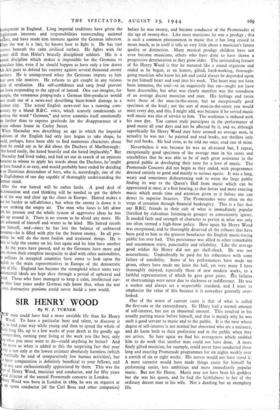SIR HENRY WOOD
By W. J. TURNER
EW men could have had a more enviable life than Sir Henry Wood. To have a particular bent and talent, to discover it Y, to find your way while young and then to spend the whole of arty long life, up to a few weeks of your death at the goodly age seventy-five, earning your living at the work you like best, only rig what you most want to do—could anything be better? And the more so when is added to this the surprising fact that your vity is not only at the lowest estimate absolutely harmless (which truthfully be said of comparatively few human attivities), but a.fairer computation is definitely beneficial to your fellows, and 111 any case enthusiastically appreciated by them. This was the eer of Henry Wood, musician and conductor, and for fifty years sical director of the annual Promenade concerts in London.
°IT Wood was born in London in 1869, he was an organist at an opera conductor (of the Carl Rosa and other companies)
before he was twenty, and became conductor of the Promenades at the age of twenty-five. Like most musicians he was a prodigy ; this is such a common phenomenon in music that it has long ceased to mean much, as in itself it tells us very little about a musician's future quality or distinction. Many musical prodigy children have not even become musicians, others who have done so have shown a progressive deterioration as they grow older. The outstanding feature of Sir Henry Wood is that he matured like a sound organism and ended as he began, as an honest, gifted, hard-working, thorough- going musician who knew his job and could always be depended upon to put himself heart and soul into his work. The heart may not have been immense, the soul—to an exquisitely fine ear—might not have been discernible, but what was clearly manifest was the soundness of an average decent musician and man. His feelings and tastes were those of the man-in-the-street, but an exceptionally good specimen of the kind ; not the sort of man-in-the-street you would meet every day, and this, I might add, was because if he served music well music was also of service to him. The workman is imbued with his own dye. You cannot truly participate in the performance of good music all your days and not be affected by it, and so, although superficially Sir Henry Wood may have seemed an average man, in actuality he was not : he painted and read books, not thrillers only but real books. He had even, as he told me once, read one of mine.
Nevertheless it was because he was an all-round but, I repeat, exceptionally good specimen of the average man in his tastes and sensibilities that he was able to be of such great assistance to the general public in developing their taste for a love of music. The Promenade Concerts did not begin as they ended, with programmes devoted entirely to good and mainly to serious rnusic. It was a long, weary and sometimes disheartening task to wean the large public finding its way to the Queen's Hall from music which can be appreciated at once, at a first hearing, to that better and more exacting music which needs time and attention given to it before one can detect its superior beauties. The Promenades were often on the verge of cessation through financial bankruptcy. This is a fact that our B.B.C. friends in their cult of what is immediately popular (fortified by ridiculous listening-in groups) so conveniently ignore. It needed faith and strength of character to persist in what was only too often termed a high-brow policy. Here again Sir Henry Wood was exceptional, and he thoroughly deserved all the tributes that have been paid to him as the greatest benefactor the English music-loving public has ever had. This persistence was allied to other remarkable and uncommon traits, punctuality and reliability. Like the average good soldier Sir Henry did not get shell-shock. He was not neurasthenic. Undoubtedly he paid for his robustness with some failure of sensibility. Some of his performances have made me groan, others have made me leave the hall, yet very many I have thoroughly enjoyed, especially those of new modern works, to a faithful representation of which he gave great pains. ffis failures or shortcomings were never due to slackness or indifference. He was a worker and always set a respectable standard, and I want to emphasise the value of this because it is nowadays generally over- looked.
One of the worst of current cants is that of what is called the-first-rate or the extraordinary. Sir Henry had a normal amount of self-interest, but not an abnoirnal amount. This resulted in his usually putting music before himself, and that is mainly why he was such a good servant to music and to the public. It is the men whose .degree of self-interest is not normal but abnormal who are a nuisance, and do harm both to their profession and to the public when they are artists. So here again we find his averageness which enabled him to do work that another man could not have done. A more finely gifted musician, for example, could never have conducted those long and exacting Promenade programmes for six nights weekly over a stretch of six or eight weeks. His nerves would not have stood it. A mere careerist would have made things easier for himself by performing easier, less ambitious and more immediately popular music.- But not Sir Henry. Music may not have been his goddess but she was his queen, and he had the faithfulness to her of the ordinary decent man to his wife. Not a dazzling but an exemplary life.


























 Previous page
Previous page